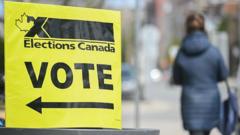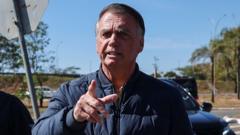Canada’s Elections Canada reports unprecedented early voting figures, suggesting major political shifts as the election approaches.
Historic Early Voting Surge in Canada's Federal Elections

Historic Early Voting Surge in Canada's Federal Elections
Canadians hit record turnout with 7.3 million advance ballots ahead of election day
More than 7.3 million Canadians have participated in advance voting, setting a remarkable record ahead of the upcoming federal elections, as reported by Elections Canada. The early polling period spanned four days during the Easter weekend, during which long queues were observed at polling stations across the nation. Notably, over two million individuals cast their votes last Friday alone. This turnout represents about a quarter of eligible voters, reflecting a 25% surge in early voter engagement compared to the previous 2021 elections.
In addition to early voters, mail-in ballots have also increased substantially, with more than 754,000 special ballots returned to the federal agency—a rise from the previous count of 660,000. With election day scheduled for April 28, the political landscape intensifies as leaders gear up for their final campaign pushes. Current polling shows the Liberal party holds a narrow 5-point lead over their main adversary, the Conservative party.
Liberal leader Mark Carney has been active in areas such as Prince Edward Island and Quebec, positioning his party as most capable of handling the ongoing U.S. trade war and President Donald Trump's tariffs. Carney criticized Conservative leader Pierre Poilievre for lacking a solid strategy to confront these challenges. "We can’t afford any further delays in addressing the impact of these tariffs," Carney remarked.
Conversely, the Conservatives are capitalizing on the desire for change after nearly a decade of Liberal leadership. Poilievre has emphasized pressing societal issues like the rising cost of living, crime rates, and housing. "We can choose a different path," he proclaimed at a recent rally while unveiling his party's platform.
Within the current political climate, the Bloc Quebecois has solidified a position in third place, advocating for Quebec’s interests, with the New Democratic Party trailing close behind in fourth. These dynamics are pivotal as Canadians prepare to make critical decisions that could reshape the country’s future.



















